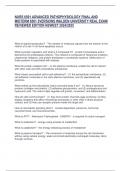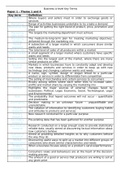Essay
Edexcel Religious Studies AS/A-Level - Unit 6 - Influences of developments in religious belief - 6.3 Religion and science debates
- Vak
- Instelling
These essays covers unit 6.3 of the Edexcel Religious Studies specification - Religion and science debates - in unit 6 Influences of developments in religious belief. They are used in Section C of Paper 1 (Question 4), include a synoptic link, and can be tailored to earlier questions of the paper. ...
[Meer zien]












